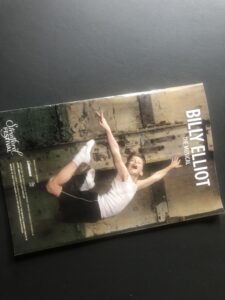
Billy Elliot The Musical at The Stratford Festival
In Billy Elliot The Musical the Stratford Festival has another smash hit musical on its hands. The whoops of joy from young girls, the thunderous applause after every number, and the outpouring of love that accompanies the curtain calls are proof enough of that. And yet . . .
Billy Elliot, with book and lyrics by Lee Hall and music by Elton John, is set in the early 80s in England’s grim, industrial north. Maggie Thatcher is gleefully dismantling Clem Attlee’s welfare state, the coal miners are on strike, and Thatcher is slowly but surely grinding them to dust. Against this Dickensian backdrop a young lad from a coal mining family discovers ballet and the joy of dancing. Will his dream of a career in dance succeed against the opposition of a community, a culture, and a father who have no frame of reference for such ambition? I don’t think it counts as a spoiler to say that of course it does, with all the attendant happiness and tears that tales of this sort generate.
The musical is a somewhat uncomfortable blend of anti-Thatcherite agitprop and a sentimental tale of struggle and success against great odds. In director/choreographer Donna Feore’s epic production politics pales against sentiment, although it’s hard not to appreciate a show that devotes an entire number to bashing the Iron Lady (“Merry Christmas, Maggie Thatcher”). The story of the miners’ grueling and ultimately tragic strike provides a compelling backdrop but its dramatization struck me as clumsy and forced.
The story of Billy’s awkward encounter with a dance class for girls led by the long-suffering Mrs. Wilkinson, the flowering of his natural gift for movement, and his journey to the Royal Ballet School works much, much better. That’s due largely to Lee Hall’s book, which is not surprising since he wrote the screenplay for the 2000 film on which the musical is based. It is lean and muscular with just the right blend of reality (including potty-mouthed, sexually precocious pre-teens), sentimentality (in the form of Billy’s dead mother who hovers like a guardian angel), and humor that arises from character and situation rather than from pasted-on jokes.
If only Hall’s lyrics were up to the standard of his book. Of course, Sir Elton’s music can’t have provided him with much inspiration. I haven’t been as bored with Elton John music since I saw his Aida on Broadway. He is much better working in the idiom of popular music, which makes “Deep Into The Ground,” described in the show as an old folk song, the best number in the musical. However, his music does rise to great heights in a beautiful dream ballet sequence. Oh, wait! That’s from Tchaikovsky’s Swan Lake.
This is the first time I have not been completely blown away by Donna Feore’s choreography. Of course, it’s hard to soar when you are held down by such an earthbound score. Her staging of the early scenes of strife at the mines involves a lot of marching around and posturing while Lee Hall tries to cram the word “solidarity” into a line of music that simply wasn’t meant to contain it.
Far better is the aforementioned dream ballet in which Billy dances with a vision of his older self (Colton Curtis). That number quite literally soars with a breathtaking interlude in which Billy swoops around the theater at balcony level thanks to a Cirque de Soleil-style rig. Feore has also found imaginative ways to make manifest Billy’s growing struggle to free his creative impulses (“Angry Dance”).
Michael Gianfrancesco’s industrial set and Michael Walton’s kinetic lighting are spot on, as are Dana Osborne’s period costumes. Jamie Nesbitt contributed some effective projections and Harry Christensen is credited a “flying director.”
Much of the considerable success of this production, however, comes down to the superb cast Feore has assembled and the touching performances she has drawn from them. Dan Chameroy, who is hysterically funny in this season’s Little Shop of Horrors, is absolutely heartbreaking as Billy’s beleaguered father. As Mrs. Wilkinson, the self-proclaimed second-rate dance teacher, Blythe Wilson turns in another brilliant performance, with a hard as nails façade that belies a warm and nurturing nature. Hysterical comic relief is provided by Marion Adler as Billy’s dotty grandma and sturdy support comes from Scott Beaudin as Billy’s brother and Steve Ross as a miner and boxing instructor.
The youngsters in the cast fare well, too. Emerson Gamble is an utter delight as Billy’s unabashed, proto-gay friend, Michael, and Isabella Steubing scores in the small role of Mrs. Wilkinson’s smarty pants daughter.
The role of Billy is so demanding that most major productions double- or triple-cast it so as not to wear out the young actor the part demands. Here the entire burden falls on the shoulders of Nolen Dubuc, an 11-year-old from Vancouver, who appears in every show. In a nice touch of showbiz irony (if you can believe his agent), Dubuc was inspired to pursue a stage career when, at the age of 5, he saw Billy Elliott.
Although only a year or so into his career, Dubuc is already an accomplished singer and dancer. He may not yet be at the peak of his technical abilities but one thing is crystal clear – the kid’s a trouper. He throws himself into every song and dance number with gusto, while projecting an admirable verisimilitude in his spoken scenes; he is completely fearless as a high-flying acrobat; and his energy never flags even though he is onstage for most of the two-and-a-half-hour show. He really does carry the show.
I can’t remember a more explosive star bow at the Festival Theatre and for once the now ubiquitous standing ovation didn’t seem pro forma. Well done, sir. Bravo!
More Reviews
To access the complete archive of reviews listed alphabetically CLICK HERE.

